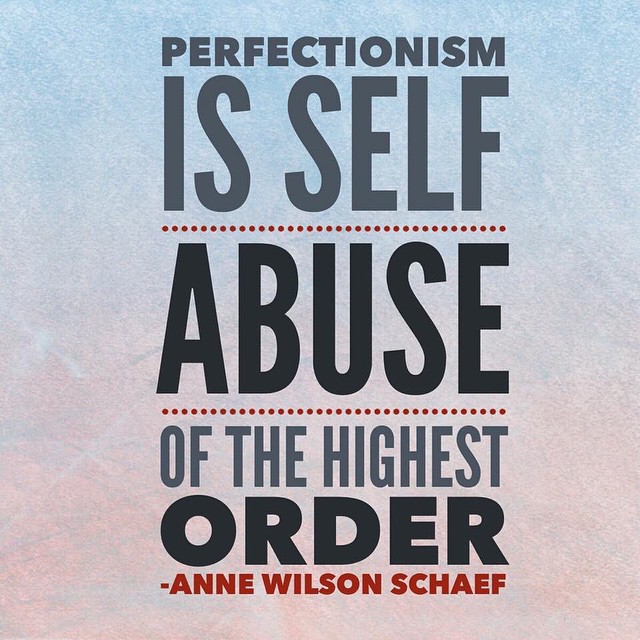Some thoughts and discussions from me.
The other day I posted the above image on my Instagram channel, as I’m a firm believer that feelings of guilt (or shame, or disgust for that matter) and food are completely unproductive.
I’ve been there. I’ve been there plenty of times. At a family gathering, a friend’s party, or even just having a too big bowl of ice cream. First comes the guilt about overeating. Then come the feeling of shame, chastising myself for not being disciplined enough. And if it’s not nipped in the bud there, even disgust can rear it’s ugly head, and the fat-talk begins, and I vow to only eat chicken breast and vegetables for the next week.
[Tweet “Why Food + Guilt Don’t Go Together via @TrainerPaige #Fitfluential”]
One would think that after all of those negative feelings, it’d be enough motivation to “stick to a diet” or “eat clean” or not “over-indulge” again, right? Wrong. It only promotes perfectionism, which we know, isn’t a real thing.
That’s why I don’t like the term “clean eating.” It also promotes this image that in order to be healthy, or be successful in reaching your health or aesthetic goals, you need to eat clean, and if you happen to have an oreo or a piece of pie, you’re automatically imperfect (eating dirty?)
Why Do Food and Guilt Not Belong Together?
But why is guilt and the image of perfection so unproductive to our goals and healthy lifestyle? It can be summed up with two words: self efficacy.
Self efficacy is the belief in oneself that she or he can be successful in carrying out a goal. It’s similar to confidence, but it takes it a step further in that it’s assurance that he or she is able to complete a task or goal at hand. And it’s ha-yuge when it comes to not only being successful in goal accomplishment, but also in whether or not you stick with what needs to be done to get there.
Guilt and Self-Efficacy
The thing is, guilt shreds self-efficacy into a million pieces, spits on it, and tosses it in the trash. Guilt and self-efficacy are inversely correlated; as one increases, the other decreases. The more you experience guilt, the more you see yourself as a victim instead of a victor, and the higher the chances are of quitting.
Self efficacy screams, yes I can!! While guilt whispers, no you can’t.
Let’s talk about a quick example. Imagine you have a goal of losing some body fat and gaining some muscle, and have determined an estimate of how much you need of each each day, in whichever method that may be. Then you go out to eat to celebrate a friend’s promotion, and the friend decides they want to go out for pizza. You oblige, and end up splitting a pizza with several others, and enjoying a couple pieces.
Now, you have a couple options:
Option 1. Immediately feel anxious and regretful after dinner, cursing yourself for ruining any progress you’ve made.
Option 2. Realize that it was just one meal, and you really enjoyed those 2 pieces of pizza. And hey, it’s only a couple pieces of pizza. I feel fine. Next food choice will be one that doesn’t involve pizza. Yay! Let’s move on.
After several bouts of these types of situations, choosing option 1 repeatedly will leave you feeling frustrated and defeated, while choosing option 2 will leave you excited to make your next healthy choice.
Guilt vs. Short-term Regret
That said, there’s a difference between guilt and a quick “oh, I probably shouldn’t have eaten that.” The thing is, when it registers that your choices aren’t congruent with your goals, it’s important to make a mental note, maybe a plan, and then let it go after that.
For example, if I’m trying to lean out a bit for bikini season, and I sit on the couch with a family sized bag of peanut butter mnm’s (my personal favorite candy) all night, that’s not in line with my goals. I might note that, toss out the bag or give to someone who wants it, and then move on with my life.
The next time you feel guilt or shame creeping up after what you perceive to be an indulgence, ask yourself:
1. Why did I eat it?
2. Do I feel OK after eating it?
3. Did I enjoy it?
4. Will I eat this going forward?
Then stop thinking about it, and move on with your day/night.
[Tweet “Why Guilt is 100% Unproductive to Your Nutrition Goals – via @TrainerPaige”]
[efb_likebox fanpage_url=”yourtrainerpaige” box_width=”250″ box_height=”” colorscheme=”light” locale=”en_US” responsive=”0″ show_faces=”1″ show_header=”1″ show_stream=”0″ show_border=”1″ ]
If you experience binge eating or any other eating disorder, please seek the help of a professional. I am not a doctor or a registered dietician. The information in this post is for informational purposes only.




Yes!!! It is so easy to get caught in that trap and beat yourself up!
Brittany @ Delights and Delectables recently posted…1st Birthday Party
I love this!! It is all about perspective and knowing that you don’t have to be your own worst enemy. The choices you make are yours and you have everything in you to change them 😉
Elsie @ Sharing Healthiness recently posted…Cutting-Edge Exercise Bars for Added Workout Variety and Challenge
I love this so much, Paige! I just published a post this morning along a similar vein. I completely agree about the ‘clean eating’ term – what a ridiculous way to describe food! Since when does our food make us dirty? Yeah, never. Great thoughts!
Jen @ Bagels to Broccoli recently posted…Carbs Are Not the Enemy
So true! There is a big difference between a quick I shouldn’t have eaten that and beating ourselves up over eating too much or the wrong food. I sometimes think these terms that started out with a good purpose – like “clean eating” begin to change form. Great post!
Lauren @ The Bikini Experiment recently posted…At My House Survey
omg!! I’ve been preaching this too. Food & feelings of guilt do not belong together. Only serves to make u feel terrible & demotivate u toward your goals. Thanks for this post!
Great Post! I struggle wit this mentality and it’s such a hard lesson to learn but we need to give ourselves a break and enjoy life!
This is such a great post. It’s really easy for me to get frustrated with myself when I don’t make the healthiest choices. It’s a good reminder that it’s what I do most of the time that matters, and that every single meal doesn’t have to be perfect.
Fiona @ Get Fit Fiona recently posted…The Blogger Imposter Lesson
Great post Paige! It’s easy to get frustrated and hard on ourselves when we don’t make the best choices, but doing so definitely just makes things harder in the long run. We can treat ourselves sometimes and still reach our goals!
Sam @ Better With Sprinkles recently posted…The Obligatory Post About Balance.
As taylor swift likes to put it–shake it off!(maybe literally with cardio dance…;))
Ha! I like it~